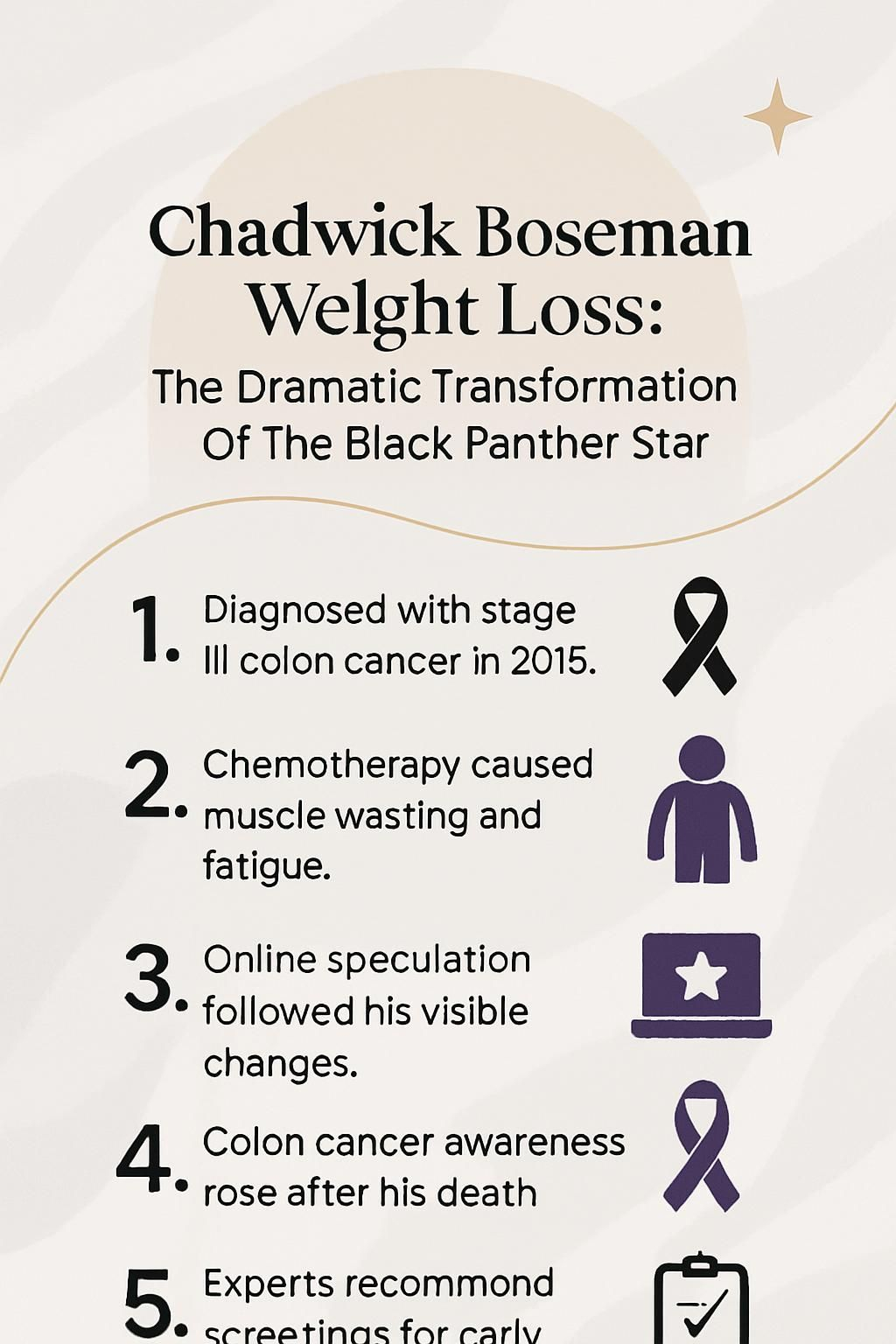Chadwick Boseman Weight Loss: The Dramatic Transformation Of The Black Panther Star
Our Nutrition Assistant AI Suite will transform your body. You will lose fat, get toned, and build muscle. Gain confidence and optimal health.
Have you ever noticed a celebrity change and wondered why? Chadwick Boseman weight loss became a national conversation after his appearance shifted from his Black Panther days. Curiosity grew, and so did rumors about his health.
This article shares clear facts about his weight loss, how colon cancer shaped his life, and why empathy should guide your comments about anyone’s looks. You will also find practical takeaways that can help you support others and care for your own health.
Keep reading for a respectful, evidence-based view of Chadwick Boseman’s journey and what it means for you.
Key Takeaways
- Chadwick Boseman’s weight loss was caused by stage III colon cancer diagnosed in 2016, which advanced to stage IV over four years while he kept it private.
- Chemotherapy and cancer cachexia, a wasting syndrome that reduces muscle and appetite, led to visible fatigue and weight loss. Up to 80% of people with advanced cancer experience cachexia (American Society of Clinical Oncology).
- Speculation and body-shaming increased online after his post-Black Panther appearance changed, sparking a public call for sensitivity toward health-related transformations.
- After his passing in August 2020, colon cancer awareness rose, especially among adults under 50. Cases in this group have increased nearly 2% per year since the mid-1990s (American Cancer Society).
- Experts recommend regular screenings for early detection. His story shows that even people who look fit can have a serious, hidden illness.

Chadwick Boseman’s Weight Transformation Journey

Chadwick Boseman’s weight change drew attention while he worked on Black Panther and other major films. Fans compared his strong screen presence to later photos and interviews, which showed a thinner frame. That contrast fueled questions.
How Did Chadwick Boseman’s Role in “Black Panther” Affect His Weight?
Playing T’Challa required a powerful build. Boseman trained hard and gained muscle for the role, which helped him look like a warrior king on screen. His athletic shape became part of the character.
After the 2018 release, people noticed he appeared to have lost weight in interviews and on Instagram. Many commented that the “Black Panther star looks skinny now” compared with his superhero look. The sudden shift sparked health rumors across social media.
I was surprised to see how much weight he had lost after playing such a strong hero.
Some discussions were thoughtful. Others turned into body-shaming, which ignored the possibility of a private medical issue.
What Was Chadwick Boseman’s Private Battle with Colon Cancer?
Boseman was diagnosed with stage III colon cancer in 2016 while filming major projects, including Black Panther and Avengers: Endgame. He chose to keep the diagnosis private, sharing it only with a small circle.
Over four years, the disease progressed to stage IV. The weight loss continued, and online comments grew louder. He worked through chemotherapy and surgeries, managing side effects like cachexia, which causes muscle loss and appetite decline.
I watched a close relative go through chemo. The treatment drained their energy and changed daily life. That experience made me value privacy and kindness even more.
While some mocked the change in his appearance, he stayed focused on his craft and his loved ones.
Public Reactions to Chadwick Boseman’s New Look
As photos spread, many people commented on the dramatic weight loss. Social media amplified both curiosity and criticism.
How Did People Respond to Body-Shaming and Criticism Online?
Many users later regretted harsh jokes after learning about his illness. Haley Ruth Spencer, an English and theater major from Tulare, California, wrote about this on Facebook. Her message resonated widely.
She wrote that unless you are close to someone, you should not question their weight changes. The post encouraged people to think before they speak, especially about visible changes that may have a medical cause.
Some realized that a public figure can look strong while still hurting in private. It is a reminder that respect and restraint matter.
You can comment on someone’s baseball cap or birthday, but their appearance should be off-limits if you’re not close.
That response helped shift the conversation toward privacy and compassion for anyone going through serious treatment, such as chemotherapy or care for heart disease.
Why Was There So Much Speculation About His Health?
The sharp change from his Black Panther physique to later images led many to guess. Since Boseman and his team did not share details publicly, rumors filled the gap.
Social platforms magnified every photo and post. Without facts, people often reached for simple answers or jokes. The lack of context made criticism spread faster than understanding.
Unveiling the Truth Behind Chadwick Boseman’s Weight Loss
Many wondered if a drug or a strict diet explained the change. Medical evidence points to colon cancer and its treatments as the real drivers, not quick fixes or trends.
What Was the Impact of Stage III Colon Cancer on Chadwick Boseman?
Stage III colon cancer affected his whole body. Cachexia, which is a complex wasting syndrome, can cause rapid muscle loss, fatigue, and poor appetite. Up to 80% of people with advanced cancer experience some level of it (ASCO).
Unexplained weight loss is common at diagnosis, affecting about 40% of cancer patients. As his illness advanced to stage IV, the visible changes became easier to spot.
The impact goes beyond clothing size. It affects strength, mood, and daily routines.
How Did Chemotherapy Change His Appearance?
Chemotherapy can reduce appetite and energy. Nausea and taste changes make eating harder. Over time, that leads to weight loss and a leaner face.
Boseman still appeared at events and on sets, which surprised many fans who remembered his earlier build. The combination of cancer and treatment accelerated his transformation.
Emotional Challenges Faced by Chadwick Boseman
Fame added pressure, yet he chose privacy. Balancing work, treatment, and public expectations required quiet strength.
How Did He Balance Privacy with His Public Life?
He kept his diagnosis within a small circle of family and close friends. On red carpets and in interviews, he focused on the work. Most viewers stayed unaware of his health battle.
That choice set a boundary and protected his dignity. Even with headlines and speculation, he stayed true to his values and his craft.
What Can We Learn from His Journey of Resilience?
Resilience can be calm and steady. While battling cancer, he filmed demanding roles and uplifted others, even when he was exhausted.
Your support for people in treatment matters, especially when you cannot see their struggle. After the diagnosis became public, the respect he received showed how empathy can change a conversation.
Insights from Chadwick Boseman’s Health Struggle
Sudden weight changes are not always about diet or discipline. Often, they signal a health issue that deserves care and privacy.
What Are Common Misconceptions About Sudden Weight Loss?
Many assume quick weight loss means success in the gym or a new plan. That view ignores medical causes like colon cancer, thyroid disease, or depression.
Online comments about Boseman’s appearance often missed this context. Visible change does not always reflect choice or better health. It can be a warning sign.
Why Is Sensitivity and Support Important During Health Battles?
Careless remarks can deepen someone’s stress during treatment. Cancer groups report that public judgment, including body-shaming, can raise patient anxiety by up to 40%.
A friend of mine went through chemo and heard jokes about her weight. She later said those words hurt more than any side effect. Choosing empathy protects people who are already carrying a heavy load.
Honoring Chadwick Boseman’s Enduring Impact
His story moved people to learn more about colon cancer and to speak with their doctors. One person’s courage started many private, life-saving conversations.
How Did He Promote Awareness of Colon Cancer?
After his death in 2020, public interest in colon cancer signs and screening increased. Health groups shared symptom lists and encouraged earlier checkups, especially for adults under 50, where rates are rising (American Cancer Society).
Families talked about screening ages and personal risk. Many learned that blood in stool, lasting stomach pain, or unexplained weight loss deserve prompt medical attention.
That focus helped reduce stigma around these discussions and pushed more people to schedule a test.
What Is His Lasting Influence on Fans and Communities?
Fans and colleagues honored him with tributes, donations, and awareness campaigns. Community groups promoted kindness online and better education about cancer.
The shift is visible in how people now talk about health and body changes. More posts ask for empathy first, facts second, and silence if you do not know the story.
Lessons from Chadwick Boseman’s Experience
His journey is a reminder to guard your health and to lead with care when others struggle.
Why Are Regular Health Screenings Crucial?
Colon cancer can grow quietly for years. The American Cancer Society notes that cases in people under 50 have increased nearly 2% per year since the mid-1990s. Screening can find growths before they turn into cancer or catch cancer early, when treatment works best.
Routine checkups also spot other risks sooner. A simple blood test alerted me to high cholesterol last year. With early changes to diet and activity, my numbers improved within months.
Talk with a healthcare professional about screening timing that fits your age, family history, and symptoms. This article is for general education and should not replace medical advice.
How Can We Advocate for Kindness in Online Interactions?
Pause before you post about someone’s body. Ask if your words help. If not, skip the comment.
Support people who face public scrutiny. Share accurate resources, report bullying, and send a private note of care. Small acts make digital spaces safer for everyone.
Conclusion
Chadwick Boseman’s weight loss reflected a private fight with colon cancer, not a trend or a choice for a role. His strength on screen matched his quiet resolve off screen.
Lead with empathy before judging appearance. Schedule recommended screenings and speak with your clinician about your risks. His legacy invites you to choose kindness, support awareness, and help others facing illness find dignity and hope.
FAQs
1. What caused Chadwick Boseman’s weight loss during his time as the Black Panther star?
Chadwick Boseman experienced significant weight loss due to colon cancer, which he kept private while filming major movies. Medical sources confirm that advanced cancer often leads to rapid and visible changes in body weight.
2. How did fans and the media respond to Chadwick Boseman’s dramatic transformation?
Many fans noticed his changing appearance in public photos and videos. Media outlets speculated about possible reasons for his weight loss, but official statements from his family later clarified it was related to his illness.
3. Did Chadwick Boseman’s weight loss affect his performance in films like Black Panther?
Despite his health challenges, reports from directors and co-stars show that he maintained a high level of professionalism on set. He continued to perform demanding physical roles even as his condition progressed.
4. Are there lessons or awareness points from Chadwick Boseman’s experience with dramatic weight changes?
His story highlights the importance of regular medical checkups for early detection of diseases such as colon cancer. Health experts recommend paying attention to unexplained body changes and seeking professional advice when needed.
Summary:
Chadwick Boseman’s transformation was linked directly to serious illness rather than lifestyle choices or diet trends. His journey brought public attention to health issues like colon cancer, emphasizing the value of awareness and timely medical care for everyone.







